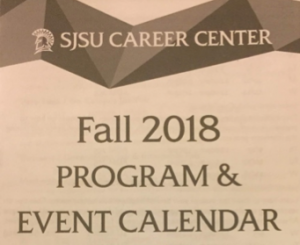Put a group of LIS students together and inevitably talk turns to the much anticipated and much dreaded job search. In this tough economy, horror stories abound and it is easy for those of us interested in working at academic libraries to become pessimistic before even sending out that first application. But how much of our talk is fact and how much is fiction? Do we really know the truth about academic library hiring? Richard Robison, Library Dean at the California Maritime Academy and veteran of numerous search committees, was kind enough to give me his insider’s perspective and answer a few of my most burning questions.
AC: What is your experience with the hiring process in academic libraries?
RR: Most of it has come from my days at Sonoma State. I was on a number of search committees as a librarian there. Eventually I chaired 3 or 4 committees. Librarians tend to be the search committees for other librarians and staff for other staff but I was also on a couple search committees for staff because I think we were a little short and we wanted to make sure we got some really good people. I would have to tally it up but I have probably been on 7 or 8 search committees.
AC: Do librarians want to be on the search committees?
RR: It varies. I know at Sonoma State there were always one or two librarians who wanted to be on every single search committee because they felt very highly invested in the organization; probably the majority could take it or leave it. So, say in Public Services, which I was in charge of, if we were hiring a reference librarian I would certainly want to be in on that search committee and I probably would have been the chair. But if it were a different area, say a systems librarian or technical services librarian then I wouldn’t necessarily feel that I had to serve on the search committee.
Sometimes I have to say you can get too many people on a search committee and it gets unwieldy. In my experience, it’s better if you have just three people, maybe a max of four then those three or four people can meet with their colleagues and say what they found out, and give their recommendation to the dean. Then the dean is actually the one who makes the ultimate choice on hiring.
AC: What is the typical process and timeline for making a hire?
RR: Well, it’s a pretty long process in the academic world. The first step is to get approval from upper administration to run a search and that usually comes, say, in the summer since we work on the fiscal year and July 1 is the beginning of the fiscal year.
Once the library gets the go-ahead then they have to form the search committee and get a chair; that usually happens at the beginning of the semester. So you’d form the search committee, say, in September and then the search committee will go about creating a strategy for advertising for the position. Then you have to have everything approved by Academic Affairs. The job description has to be created and has to get sign off. The ad you’re going to put out there has to get created and get sign off. And so you do those things and then let’s say sometime in mid- or late October you put the job out and you usually keep the job out for two months. You keep it open and the applications come in. You’re not allowed to look at any of them until the job closes.
AC: So it doesn’t make any difference when you submit your application? I’ve always wondered about that.
RR: No it doesn’t make a difference if you apply the first day or the very last day. We’re not allowed to look at [the applications].
On that last day when the job closes, you’re talking probably mid- or late December. At that point, the search committee takes those 75, 100 applications and tries to cull them down to a manageable list of 10 to 12. Out of those, they may decide to do telephone interviews with eight.
Maybe by the end of January, they do the telephone interviews and from those eight you cull it down to three, with maybe one alternate candidate. At that point, you schedule in-person interviews and then, because there are some logistics involved in getting someone to campus, in early March you set aside two weeks for in-person interviews. By mid- to late March you reconvene and decide you like so-and-so and then maybe a week goes by and at that point the Dean would get the recommendation and double check with the Provost that there’s still money—you always have to make sure the money is still there. She would offer the candidate the position and then that person could negotiate or not, or turn it down.
For the timeline, you’re maybe giving someone a job offer around the end of March and then usually most libraries like to get someone onboard as quickly as possible, definitely by June or July 1st. You start the whole thinking process at the beginning of September and maybe you’ll be done hiring someone by the end of March. So about 7 months and that’s one of the frustrating things, for people who apply as well. That’s the academic job recruiting experience. It takes a long time and that’s pretty typical.
AC: If a LIS student is graduating in June, is it worthwhile for them to apply for a job before they graduate?
RR: Oh yeah, and that’s what I did when I applied for my job with Sonoma State. I was going to graduate in Spring ’03. I applied for the position before it closed, probably end of the year ’02 before I had my degree. They brought me in for an interview, I was offered the job and I started July 1st. I got really lucky. I only applied for one job, got the interview, got the job. I was very fortunate it worked. Most library school students don’t have that kind of luck.
AC: What materials do you require candidates to submit when they apply?
RR: Candidates usually are required to submit an updated CV and a CV as opposed to a resume because in the academic world the CV is longer and includes things like publications and presentations. Included with the CV is usually three references and a cover letter and that’s pretty much it.
After you get an offer then you have to send your transcripts in. Some places might ask for transcripts ahead of time but most don’t until you’ve been offered a job because they have to verify that you’ve graduated.
AC: So it’s not like you need a certain GPA or your offer will be taken back?
RR: No, No, I don’t think GPA really matters too much. Actually, what matters more is what you’ve done.
AC: You hear when people apply for really competitive positions that their application gets maybe one or two minutes of consideration. How long do you usually take evaluating applications?
RR: Well that is fairly true that sometimes it can be very quick. Usually what will happen is that in the job description you will have your minimum requirements and your preferred requirements. Basically, if someone doesn’t meet the minimum that’s the first pass. Say you have those 100 applications and you do your first pass and discover 20 don’t even meet the minimum requirements, they just get rejected instantly. If it weren’t competitive maybe that wouldn’t be so much the case.
Once you’ve done the first pass, you divide the applications up among the search members. I would say, at this point, it definitely takes longer than two minutes—between two and five is reasonable. So every committee member will take their two and five minutes to score candidates and then the search committee will come together and compare scores. Then they’ll cull the list some more. After the three or four committee members have talked, they’ll get down to 20. Then you look at those 20 more closely again. Once you get down to 10 or 12 then you really are reading everything and spending a lot of time, but the initial stages can be pretty fast.
AC: What makes a candidate a strong candidate?
RR: It really depends on the position and what you’re looking for. Generally, what makes a strong candidate is someone who has some experience. If they don’t have experience then they’ve done other things like publications or presentations that have shown that they are active and knowledgeable in the profession. You need a CV that captures someone’s attention. If your cover letter addresses what they’re asking for in the job description, that’s really important actually. People need to mirror to a certain extent what’s in the job description. You really need to take a little time and customize each cover letter so that it does address each job.
So what makes a strong candidate once you bring them in for the in-person interview? A combination of being able to intelligently answer the questions of the search committee, which usually is a panel interview of two hours, and during your presentation, the ability to be comfortable relaying information to a group. And just overall interacting with the other librarians because in the academic world, you go to lunch, you go to dinner and there are all these intangibles.
AC: That leads me to two other questions. First, for the presentation you’re required to do, does the candidate pick the topic or does the search committee?
RR: In my experience, the committee will pick the topic. Sometimes if it’s an instruction librarian position, the topic will be really specific like teach an introductory lesson on how to use the Academic Search Premier database. But I think for the most part it kind of evolves. You might be asked to teach an introductory lesson to freshmen on writing a literature review, and then it becomes about the presenter and how they want to address that topic. If the presentation is for a tech job like website design you might have to address what you know about the latest good practices in website design for libraries. For a technical services person it might be a presentation about the evolving world of metadata. It would still be kind of broad but each candidate will address it in their own particular way.
AC: And my second question was regarding all the eating you do at library interviews: what is the thinking behind that?
RR: Well, I think the thinking behind that is that you’re hiring someone for a tenure track job and once you hire them, even though they aren’t tenured yet, you’re potentially giving someone a job for life. It’s really hard to get rid of anybody, honestly. I think the idea is we want to weed candidates out and evaluate them as much as possible. Nevertheless, it doesn’t work. It just simply doesn’t matter if you spend a day or two days with a person. Until you actually work with a person on a job you really don’t know them, it’s all just impressions. All hiring is taking a chance.
AC: But terrible table manners wouldn’t be a deal breaker?
RR: It depends on who you are. Some search committee members would notice that and some might not care. It is kind of funny. Some of those little social cues are important for some and not for others.
One of the things I changed in the last couple searches I did before I left Sonoma State since I was the chair was that we used to bring people in first thing in the morning, say at about 7:30 or 8:00 am and run them through this whole litany of the day’s events and then end with dinner at 6:00 pm. Basically it was a 12 hour day and it was exhausting. I saw other libraries doing this so I can’t take credit for this idea but what we did was change it around for candidates so that before their interview day they would have dinner with the Dean and search committee and any librarians that wanted to attend. Then in the morning they would do the interview, presentation, lunch, meet and greet, administrative stuff, and then go home. So rather than have that one 12 hour day, we broke it up because otherwise you’re fried when you go to that dinner. Even though people tell you that you can relax because you’re done with the interview, you can’t because you’re still on and people are evaluating you.
AC: Would a poor personality fit completely ruin your chance at the job?
RR: Yes.
If you come in and are unable to verbally communicate well with the search committee, if you seem incredibly nervous, those are cues that work against a candidate. It helps if you’re relaxed and you go into it with a sense of humor. It puts the search committee at ease. If you’ve done your research and thought about the organization and the profession ahead of time and can just sort of speak to things that the job description addresses then you’ll be fine.
AC: Do you have a favorite interview question?
RR: Oh god, I have some non-favorites. I do think the question, “what are your weaknesses?” is pretty lame. There are questions out there in the interview process that are just artificial and you know people are just going to give you the answer you’re looking for. To the extent that is possible, I try to throw those questions out and ask questions that are a little more open-ended and allow the candidate to just talk and express themselves. A favorite though, I do think a person needs to be able to speak to their strengths.
AC: And finally, what advice do you have for library students about to go on the job market?
RR: What advice? My advice would be to get as much experience as you can whether that’s being an intern or volunteering or a part-time position somewhere. Experience trumps everything. Just having the degree, especially these days with the tighter job market, isn’t enough. You need to find ways that are going to separate you from everyone else. If that’s volunteering at your public library teaching adults to read or whatever, it shows that you’re engaged and have worked with people. If you’re looking for a technical position, show that you’ve designed websites or multimedia tutorials. That’s the thing. The degree is only the degree. Do as much as you can to gain experience.
Find Out More:
For more information on landing your first academic library job, here are some links to freely available online articles:
“Finding a Library Job” by Rachel Singer Gordon, on Library Journal
“HOWTO: Apply for a Library Job” on the LISWiki
“The Job Hunt: What I Learned” by Meredith Farkas
—
Amanda Choi is both thrilled and biting her nails to be in her final semester at SLIS. Currently, she lives in Vallejo, CA and is a Digital Learning Intern at the California College of the Arts’ Meyer Library in Oakland. For your listening pleasure, she highly recommends the online literary reading series, Apostrophe Cast, which she co-edits.




Excellent article! The timing was perfect for me! Amanda, good luck in your final semester!